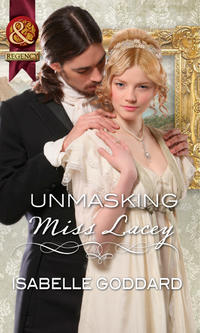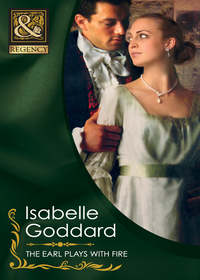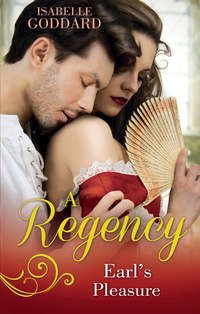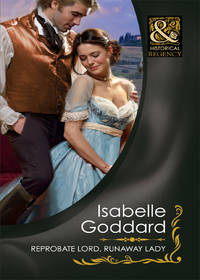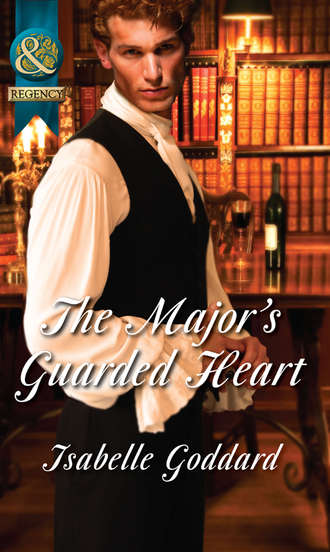
Полная версия
The Major's Guarded Heart
‘Then I fear you may be in need of spectacles!’
The other servants cackled joyfully at this sally, but Mellors’s face took on a truculent expression. ‘It were an easy mistake to make, Sir Justin. We’ve ’ad a spate of poachin’, you knows that. You told me yerself to be extra vigilant.’
‘Vigilant, yes, foolish, no. You had better wait for me in the office—I may be some time... And take that gun with you.’
The man slumped to the door, still ruffled. ‘She wuz trespassin’ for sure,’ he managed as a parting shot.
Justin Delacourt turned impatiently to face his audience who seemed caught in a trance and had barely moved since he had entered the room. ‘You may forget the coffee—but make sure that tea is ready in the library in ten minutes.’ His tone was even more severe and the servants, forgetting their earlier gaiety, speedily resumed their chores.
Striding across the room to the hanging line of brass bells, he sounded one vigorously. ‘I have this minute rung for my housekeeper, Miss Ingram. Mrs Reynolds will be with you shortly to escort you upstairs, so that you may—um—tidy yourself.’
He accorded Lizzie a brief bow and, without another word, walked through the door.
* * *
He strode to the library and waited. What the devil was the girl doing wandering in his grounds? Was Mellors right when he said she was trespassing? She must have been, otherwise why had she not called at the lodge and asked the porter for admittance. And how had she got in? The lodge gates were the only entrance to the estate, a fact bemoaned by servants and masters alike for years, but nothing had ever been done to improve the situation. And nothing would be done now, for there was precious little money for refurbishment.
But Miss Ingram. He had been stunned at the sight of her and not just because she had no place in his kitchen. Even in her sodden condition she had looked lovely, her soft brown eyes wide with indignation and her fiery curls already drying to a glossy mass. He hoped her dress was not completely ruined for he thought it likely that her wardrobe was not extensive. Until the gown could be laundered, Mrs Reynolds must find a replacement from one of the many wardrobes scattered across the house. It would probably not be to Miss Elizabeth’s taste but then she should not have come calling in a downpour, or, more accurately, she should not have come trespassing. He would have some questions for that young woman.
* * *
It was at least half an hour before he could pose them and when she slipped quietly into the library, all desire to question her fled. Her skin, still luminous from the rain, was blooming with health and her dazzling hair had been marshalled into some kind of order. But it was the dress that mesmerised Justin. A deep blue of the finest silk, years out of date, but showing the girl’s shapely figure to splendid effect. He almost gasped. His mother had worn that dress and she, too, had been beautiful and well formed. In body at least, he amended, for there was nothing beautiful about Lady Delacourt’s nature. But what had possessed the housekeeper to alight on that particular gown? He could only imagine that it was one of the few dresses that fitted his unexpected guest.
A lace shawl was draped across her bosom—just as well, Justin thought, else the temptation to caress her two beautifully rounded breasts would be too strong. His thoughts juddered to an abrupt halt. He was shocked, shocked at himself that he could think thus of a girl he hardly knew. ‘Come in, Miss Ingram.’ He had to clear his throat which had become very tight. ‘Come in,’ he repeated and gestured to the table. ‘Alfred has brought tea and there are fresh baked madeleines. I hope you will partake of some or Cook will be disappointed.’
She did partake and with gusto. Justin thought he had never seen a young lady so happy to eat and the sight was strangely pleasurable. She became aware that he was watching her. ‘I had hardly any breakfast,’ she explained naïvely, ‘and walking in the rain has made me ravenous.’
It was not exactly the response a society miss would have given, but then Miss Ingram was hardly a society miss. She was a hired companion who spoke confidently and looked good enough to eat herself. In short, she was a conundrum.
‘Walking was not all you were doing, I imagine,’ he said gently.
She flushed a little and looked defiant. ‘No, it wasn’t. I was being marched across your estate.’
‘But why were you in the Chelwood grounds?’
‘I became confused and lost my way. Then that clunch of a bailiff found me and took me for a poacher.’
‘You must excuse Mellors. He is new and very eager to be seen doing a good job.’
‘He hasn’t exactly covered himself in glory this morning,’ she noted, munching her way through her third madeleine.
‘But you,’ he said, determined to bring the conversation back to her. It was difficult when she was sitting so close and looking more lovely in his mother’s gown than ever Lady Delacourt had. He tried again to focus his mind. ‘The only way into Chelwood is through the lodge gates and you didn’t come that way. How did you get into the estate and why?’
The question was bluntly put for he had given up any pretence of subtlety. He couldn’t play word games, not while his body was reacting so treacherously.
‘I climbed the wall.’ Her defiance was even more marked. ‘And as for why, because it blocked my way.’
‘Do you normally scale walls if they’re in your way?’
‘I don’t normally meet them. Most people don’t feel the need to live behind locked gates.’
She had quite neatly turned the tables. ‘My bailiff considers that locking the gates acts as a deterrent to law breakers. But then he is unused to adventurous young ladies.’ As I am, he thought. The idea of any woman in his mother’s tight little circle lifting one elegant foot to the wall was laughable.
‘Adventurous? Do you think so?’
‘Few ladies of my acquaintance would hurl themselves over ten-feet walls.’
‘I didn’t exactly hurl myself and your friends must be sad company.’
‘Acquaintances,’ he corrected. For some reason he did not want her to think he was part of the ton society he despised. ‘But you are right, they lack courage! They would never make a soldier!’
‘I would—and that is what I most wish for.’ He was startled for he had meant the remark only as a pleasantry.
She saw him looking astonished and laughed. ‘Don’t worry! I know that a woman cannot join the army, but I would give anything to do so—to be in Spain at this moment, to feel the camaraderie, the excitement, the thrill of victory.’
‘Victory is not assured,’ he warned. ‘We have lost almost as many battles as we have won and it is only recently that the tide has turned.’
‘I know. At Badajoz and Vitoria.’
He was intrigued. ‘You have followed the war closely?’
‘My father is fighting in Spain,’ she said simply.
‘Your father?’ Her name had had a familiar ring, he remembered, when Mrs Croft first introduced her, but he had taken little notice. He had been far too concerned with her prettiness to think of anything else and far too disturbed by his response to it.
‘He is not by chance Colonel Ingram?’
‘He is.’
She was transformed, her face alight, her smile glowing. It was clear that her father was a hero to her—and why should he not be? Justin knew him by repute as a very brave man. ‘You have met him?’ The words were almost breathless and the plate of madeleines pushed to one side.
‘Once. I met him only once. It was after Vitoria. His regiment was taking over from mine and I was about to leave. I had just received news of my father’s death and knew that I must return to England immediately.’
‘And how was he?’ She was all eagerness. ‘After the battle, he wrote only two lines to say that he was alive.’
‘He appeared well, but I was with him little more than an hour.’
‘Then that is one more hour than I have known.’
He refilled her cup and wondered if he should say more, for her voice had become shadowed and her liveliness lost. At length he said, ‘When did you last see him?’
‘Some three years ago.’ She jumped up from her chair and wandered to the window. ‘You have a vast estate here.’
For some reason she no longer wished to talk of her father and he wondered what had happened three years ago. He found himself wanting to ask, wanting to know more of her, but good sense reasserted itself. He must keep the conversation to polite trivialities. ‘Yes, most of it is given over to sheep farming, though we have some pleasant acres of parkland and a thriving kitchen garden.’
‘Everyone farms sheep here.’
‘That’s because it is profitable, especially now that taxes have been reduced and we can export to France without a huge levy. The smugglers have gone out of business,’ he joked.
‘There are smugglers here?’ She had turned back from the window, her eyes wide and her voice humming with excitement. The girl’s vitality was entrancing, he thought, but she had a raw energy that could easily lead her into trouble. Another reason, if he needed one, to keep his distance.
‘The smugglers have long gone,’ he said firmly. ‘Once the taxes were rescinded, smuggling lost its profit and therefore its attraction.’
‘But it cannot only be wool that was smuggled.’
‘Spirits and tobacco, I imagine. Perhaps even tea. But the last gang of smugglers were hanged years ago and the preventives are now everywhere along the coast.’
‘The preventives?’
‘Excise men. So you see, you are unlikely to discover an adventure here.’
Her face had fallen and he had to stop himself smiling at her disappointment. ‘You must find life as a companion a trifle slow.’
‘Mrs Croft is very kind,’ she said quickly.
‘But still a lady in her eighties. Why did you take such a post?’ The more he spoke to her—indeed, the more he looked at her and felt her charm, the more odd it seemed.
Her response was tart. ‘Possibly because I don’t own an estate like Chelwood.’
He could have kicked himself. She had evidently to earn her own living—no doubt Ingram was in debt and unable to help. Most soldiers he knew were, for much of the army had not been paid for months.
‘I’m sorry,’ he began, wishing away his crass comments.
‘There is no need to apologise, Major Delacourt. I find military men in general are blinkered. They see only the narrow world that is theirs and nothing of the world outside which can be quite as difficult as any military campaign.’
‘I’m sure it can be.’ He could find nothing better to say, but to his own ears he sounded indifferent, even condescending.
When she spoke again, her tone was a little too bright. ‘I must leave you in peace. The rain has stopped at last and I should return to Brede House before it begins again. If you would ring for your housekeeper, I would be much obliged. By now my dress should be dry.’
‘Nonsense. I will make sure that your dress is returned clean as well as dry, but in the meantime I will drive you back to Rye. The gig is at the door and you can be home in minutes, rain or no rain.’
She looked as though she might refuse his offer but when she stood, it was evident that her ankle was paining her and she capitulated.
‘Thank you. That is most kind of you.’
* * *
Neither of them spoke as they drove the five miles back to Brede House, but he was acutely aware of her warm body sitting snug beside him and of the slightest trace of jasmine filling the air. He tried hard not to think about her, to abstract his mind from her proximity, but failed miserably. His sharpened senses relished her very nearness and he could only thank heaven that the journey was brief. There was no space in his life for a woman, for any woman. Women were the very devil—he should know that better than anyone—and could ruin the best of men’s lives. From a young age he had steered clear of entanglement despite others’ best efforts and he was not about to let a girl he had met by chance destroy his peace of mind. She was a mere acquaintance, not even that, an acquaintance of an acquaintance. But it seemed that she was refusing to play the part assigned to her—she had given him no clear answer as to why she was wandering in the grounds of Chelwood and he had the uncomfortable suspicion that she had come looking for him. If so, alarm bells should be ringing very loudly. Her physical attractions were manifold and they were dangerous, he was quite aware of that. If that was all...but he knew it was more than that—there was an ardent soul behind those deep-brown eyes and even in the small time he had been with her, he’d found himself tumbling towards its bright sun. That thought made him crack the whip and the startled horse immediately picked up its pace. He really must curb such fanciful inclinations, he reproved himself silently. Elizabeth Ingram was no more than a shadowy presence in his life and must remain so. She was far too lively and far too attractive and he had sufficient problems already.
Chapter Three
Lizzie bid a prim farewell to him at the entrance to Brede House. Crunching her way along the gravelled drive, she was careful to hold her head high and not look back at the carriage. He was just a little too alluring. What a pity that Piers Silchester did not exude the same attraction, for as Miss Bates was fond of pointing out, he was everything she should want: loyal, loving, stable. The trouble was that she didn’t want it, or at least not enough. Instead she seemed continually drawn to men who offered fleeting excitement rather than a secure future. Soldiers lived in an exclusive world—she knew that from bitter experience—and it was a world in which women had no part. Justin Delacourt was most definitely a soldier, a gentlemanly one, but nevertheless a soldier. He lacked understanding of the cramped life she was forced to lead, knowing nothing of the narrow horizons which bound her. It would be years before he settled to any kind of humdrum life and in the meantime female company signified for him a little pleasantry, a little dalliance only.
Why was a woman’s life so very difficult? A small sum of money was all it would take to give her independence, but even a little money was beyond her. Still a companion’s life, for all its limitations, had to be better than marriage. Being married was too dull for words and being married to Piers Silchester, gentle soul though he was, the dullest of the dull. That was the choice that Clementine Bates had offered and she couldn’t blame the woman—she knew herself to be a liability, a loose cannon prone to fire in any direction. It must have been a blessed day for Miss Bates when she learned from her blushing music teacher that he hoped one day to make Miss Ingram his wife.
Lizzie was old enough now, though, to know that she could not afford to lose her heart to an adventurer. One day she supposed she would have to marry, heart or no heart, and doubtless Piers would be the lucky husband. He was the most dependable man she knew and, most importantly, he was willing to adore her. He would make her his goddess. She tried to imagine Justin Delacourt worshipping at her altar and the thought made her chuckle.
She wondered if he even found her attractive. He had certainly stared long and hard when she’d entered the library wearing that dress, his ever-changing eyes shading from light to dark as his glance held. Goodness knew why, since the garment was the frumpiest thing imaginable. But he had stared nevertheless and not in a pleasant way. Mrs Reynolds had confided in the bedroom that the gown had belonged to the Major’s mother, someone she called Lady Delacourt. Her tightened lips suggested to Lizzie that there was something odd about the woman. Was she dead? If so, why hadn’t the housekeeper mentioned the fact, especially since Sir Lucien had only just died himself? And if she wasn’t dead, then where was she? The dress was old fashioned, it was true, but she saw immediately that its material was richly luxurious and that it was beautifully made. Lady Delacourt must at one time have enjoyed wealth, enjoyed being spoilt, enjoyed being adored. Perhaps she had been made a goddess. If so, it was unlikely to have been her son doing the adoring. After that first amazed stare, his face had registered a dour distaste.
* * *
She had reached the front entrance of Brede House and was about to raise the cast-iron anchor that served as a knocker when the door flew open and a figure dashed past her, nearly knocking her down. It was female, wild eyed and seemingly distraught. She had a brief glimpse of a face before the woman started down the drive at the most tremendous pace. Lizzie looked after her in astonishment. It was Mrs Armitage, she was sure, the woman she had seen in the churchyard. Why was she visiting Mrs Croft and why had the visit upset her so badly that she had tossed aside all vestige of propriety?
Lizzie walked into the hall and saw that the drawing-room door had been left ajar. Cautiously advancing into the room, she spied the remnants of tea scattered across the small occasional table that her employer used when visitors called—a plate of uneaten macaroons, a teacup tossed on its side. It seemed that this had been a social call, but what kind of social call ended with a flight such as Mrs Armitage’s? Or for that matter left the hostess prostrate. Her employer was slumped into one of the armchairs, her hand to her forehead as though nursing a sick headache.
‘Mrs Croft?’ she said gently. ‘Are you feeling unwell?’
At the sound of her voice, the old lady stirred and, seeing Lizzie’s anxious face looking at her from the doorway, attempted to pull herself upright.
‘No, my dear, I thank you, just a little tired.’ Her voice was barely above a whisper. ‘Socialising at my age can be a little trying, you know.’
Mrs Croft evidently did not wish to dwell on whatever had occurred and Lizzie wondered if she should leave the matter. It would probably be as well to escape now before her employer recognised the outdated dress she was wearing. But she could not leave her in such a mournful state.
‘I saw Mrs Armitage,’ she mentioned quietly. ‘She passed me as I came through the door. She seemed very upset.’
The old lady did not look at her, but uttered the deepest of sighs. ‘I’m sorry you were witness to her distress. Caroline is grief-stricken and her behaviour at the moment is unpredictable.’
‘But why? I mean why is she grief-stricken?’ That sounded a little harsh, Lizzie thought, and tried to infuse more sympathy into her next words. ‘I had not realised that Mrs Armitage was so attached to Sir Lucien.’
‘Not Sir Lucien, my dear,’ Mrs Croft said gently. ‘It is her son she mourns. She has lost Gilbert.’
‘Lost as in dead?’ Lizzie queried, wide eyed.
‘Lost as in lost. You might as well know, since it is now common knowledge. Gilbert Armitage disappeared some months ago and his parents have been unable to trace him. No one seems to know a thing about his disappearance.’
‘How strange. And sad,’ Lizzie added quickly. ‘But why was she so distressed? She could have received nothing but comfort from you.’
‘That is where you are wrong, I fear. I could not give her what she wanted. She has asked me to intercede with Justin Delacourt, to put all his other concerns to one side and search for her son. I told you, did I not, that Gilbert Armitage was the closest of friends with Justin?’
‘You did. But why was she so upset with you?’
‘Because I refused. I cannot bother Justin at a time like this. He has so very recently lost his father and been left an estate which is in near ruin. It will take him an age to put it right and I know that he is desperate to return to his regiment.’
‘Could she not ask Sir Justin herself—if he is so very close to the family?’
‘She has already asked him for help, but she wanted me to add my voice to her pleas. I could not in all honesty do that. Justin has more than enough to contend with. If he has promised to help in the search, he will do so—he is a man of his word—but it must be on his terms and at a time of his arranging.’
‘And that is not what Mrs Armitage wants?’
‘No, indeed. He must drop everything. I am afraid that she is slightly unbalanced at the moment. Her son was everything to her. He was a late child, you see, a delicate boy, or so Caroline always maintained. His disappearance has sent her teetering over the edge of an abyss and none of her friends’ advice or her husband’s care has been able to prevent it.’
‘I am sorry that you have had such an uncomfortable afternoon, Mrs Croft.’ Lizzie felt genuine concern for her employer, the old lady’s pallor testifying to how badly shaken she had been. ‘Can I bring you some water, perhaps, or fetch down the footstool for you to rest more comfortably?’
‘No, but thank you for your kind thoughts, Elizabeth. I shall sit here a while and listen to the river. It is nearly high tide, you know, and already I can hear the waters lapping in the distance. It is a most soothing sound and will soon restore me.’
* * *
Lizzie took her cue and slipped out of the room and up the stairs. Once in her bedroom, she stood at the open window and listened to the same water tumbling across the small, stony beach which lay just beyond the garden. Taking up her sketch pad, she began to draw—not the river snaking below, nor the clouds above busily filling the sky. She drew a face, one she had studied well and but recently. When she had finished, she was pleased with her portrait—the strong, lean cheek bones, the eyes steady and appraising, the hair a wild halo—but she was not so pleased with herself. She should cast the Major from her mind. From the outset he had fascinated and his curt indifference when they’d first met had only sharpened her interest: he was an invitation, an enjoyable project to lighten the dull days ahead. But this morning it had taken only a very little time in his company to realise her mistake. He was far too attractive, certainly too attractive to treat lightly, and if she were sensible, she would keep her distance. She looked down at the paper on her knee. What on earth was she doing, drawing portraits of the man? She took the sheet of paper and tore it neatly in half, dropping it in the nearby waste bin. He was a footloose soldier and she must forget about him and instead school herself to appreciate the estimable Piers.
There was a soft knock on the door and Hester came in, carrying fresh bedding and towels.
‘Is mistress feeling any better now, Miss Elizabeth?’
‘She is resting. She wished to be left alone.’
‘She shouldn’t be put under that kind of strain, not at her age she shouldn’t.’
‘Mrs Armitage was very upset.’
‘Mebbe. But that ain’t no excuse for upsetting an old lady like she’s done.’
Hester had been with Mrs Croft for years and had a fierce loyalty to her mistress. She knew everything that happened in the house, and no doubt in Rye itself, without ever being told. A thought wormed its way into Lizzie’s mind and she could not stop herself from listening to it.
‘Do you know anything about her son’s disappearance, Hester?’
Why on earth was she gossiping with a maidservant? She knew why. It seemed that she was not yet willing to forget Justin Delacourt entirely and Hester might provide some small piece of ammunition in any future tussle with him. As so often, she was choosing not to be sensible.
The maid appeared unwilling to answer and looked fixedly down at her feet. ‘You do know something, don’t you, Hester?’ Lizzie probed.
‘Not rightly, miss. It’s probably nothing and I shouldn’t be saying it, but Mr Gil was fair taken with that gypsy woman and I’ve been wondering if she had anything to do with his going away.’
‘A gypsy woman?’ Lizzie tried hard not to sound eager, but her nerves were tingling. Could there be a real adventure here?
‘She weren’t truly a gypsy. But she didn’t seem to have a proper home. And she mixed with some queer company—still does for that matter.’
‘So she is still in Rye? Who is she, Hester?’



